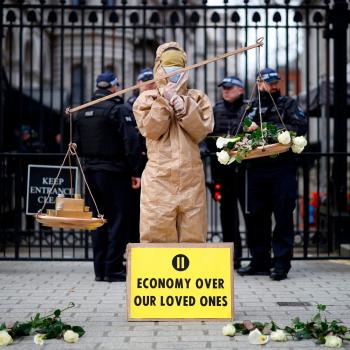Why Is the Social Gospel Considered Heresy?
Some attribute the Social Gospel to Walter Rauschenbusch; while, this particular website attributes it to Washington Gladden and, Religion News (RNS) refers to both and another guy I’d never heard of (Charles Sheldon).
Most interestingly, this is where the infamous slogan, “What Would Jesus Do?” originated from; that is, within Charles Sheldon’s novel titled “In His Steps” where he essentially breaks down what is now labeled as “the social gospel.”
Most of us, today, recognize this social form of the gospel to be attributed to men such as Tony Campolo, Brian McLaren, or Jim Wallis; while at the same time we also associate the aforementioned slogan and those “W.W.J.D.” bracelets to be associated with evangelicalism…
You see, there’s why people consider the social gospel to be heresy and then there’s what the social gospel actually is – which, most of us today, even [small “e”] evangelicals would not consider it to be “heretical”…

What Even is the Social Gospel?
The Gospel, it is more than just social action.
The social gospel is just a reminder to us of this fact. It’s intentionally redundant.
“The Social Gospel Movement was a religious movement that arose during the second half of the nineteenth century. Ministers, especially ones belonging to the Protestant branch of Christianity, began to tie salvation and good works together. They argued that people must emulate the life of Jesus Christ[1].”
Leaders of this particular movement put emphasis on verses such as “love thy neighbor.” Much like todays progressive leaders they published books and spoke nationally promoting this form of the Gospel.
More importantly, women took the helm of this movement; they ran settlement houses that were “designed to alleviate the sufferings of immigrants living in cities like Boston, New York and Chicago…” As RNS goes on to say, “Their mission was to draw attention to the problems of poverty and inequality – especially in America’s growing cities.”
Sound familiar?
Apparently, this was a movement that began in the late 1800’s. It’s seemingly always been political. As today we see it most active within political movements, such as the “Reclaiming Jesus Movement.”
So, then the question still yet remains: Why do people consider the social Gospel to be heretical?
Why It’s Considered Heretical…
Faith cannot be separated from works and good works done by man cannot be separated from God’s grace… simple, right?
Well, not so much; as there are three particular reasons given here by the social gospel’s detractors:
One.
“We’re saved by grace not works…”
It’s the age-old argument between grace and works and their impact on salvation. The well-known theologians of our reformation (e.g. Luther, Melanchthon, etc.) emphasized grace. They emphasized the fact that we are saved by grace through faith; this is opposed to being saved by works and works alone.
“8 For it is by grace you have been saved, through faith—and this is not from yourselves, it is the gift of God— 9 not by works, so that no one can boast.”– Ephesians 2:8-9 New International Version (NIV)
In short, Luther et. al are saying that no matter how hard we try one cannot earn their way into heaven; while the social Gospel, it’s maintaining the argument that salvation consists of not just personal but social implications.
Maybe it was a marketing campaign genius-ly put together in order to garner attention but we (meaning these theologians, pastors, and writers) unnecessarily pit grace and works against each other. When, in reality, neither is in conflict with the other.
It’s not an “either/or;” it’s a “both/and.”
The point of asking “What came first: the chicken or the egg?” isn’t to actually figure out which came first; it’s to make a point in that it’s mostly futile to argue which came first. Both exist in the here and now and one cannot exist without the other. At least, within todays version of the Social Gospel rarely will you find a theologian arguing that we’re not saved by “grace.” They’re just emphasizing the fact that because one is saved by God’s “irresistible grace” (taking from “TULIP”) we are then lead into what Bonhoeffer would call “incarnating the life of Christs.”
Two.
“The social Gospel blames sin on societal structures rather than human nature…”
Piggybacking on the above argument as Rauschenbusch argued that our salvation will then impact others; there is the push for socio-political action for the sole purpose of changing the greater system.
Calvinists, and conservatives, alike quickly redirect the blame of sin on our human nature (i.e. total depravity; the “T” from TULIP). While, the social Gospel would, reportedly, blame sin on systemic injustices.
From one perspective it could seem as if proponents of preserving various forms of systematic theology at the cost of helping others. Ironically, if you as a masochist and decide to read through Calvin’s “Institutes of the Christian Religion,” you’ll find there is only but a few lines having to do with social justice.
(there are 356 pages in this particular translation of Institutes)
Three.
“The social Gospel places too much emphasis on cultural restoration of society…”
As the third critique from detractors of the social gospel they despised the amount of cultural involvement; as the denial of “the world” was central to much of what these detractors pushed.
“Social salvation belongs to the heart of Christian thought, at least at the points suggested by the chapter headings of this book. Especially does it belong to any adequate treatment of the salvation of the individual soul. Social conditions do not of themselves save souls but they do of themselves damn souls, if damnation is interpreted not as a legal status known to God alone but as a quality of life known to men only too well[2].”
I’d be remiss if I didn’t mention the far-reaching association between Marxism and socialism many leaders (that are politically leaning “right”) associate this form of the gospel with. Again, key term here is “far-reaching”… While to be fair, there are definitely a handful of quite noticeable crossovers and similarities it falls quite short but would also take more than a paragraph to break down why – maybe some other time (until then, feel free to read this book by fellow writer Tylor Standley)
A vast majority of people do not intentionally back or associate themselves with the political forms of the conservative or the social “gospel.”
Let me be clear: Any gospel associated with a political agenda is not the gospel.
How This Bridges the Gap Between Progressives and Evangelicals…
Most people are coerced into unknowingly supporting a political movement that markets itself as Jesus but at its very root is toxic.
Similar to denominational allegiances theological differentiations are being more and more blurred; as our modern day popularized version of evangelicalism is vastly different than how our conservative politicians would like us to believe.
This understanding is important because, in my own opinion, while it doesn’t fully “bridge the gap” between progressives (us or them) and evangelicals (them or us), it does show progress towards this happening and shine light upon the fact that maybe we’re not all that different.
Conferences such as “Passion” or Churches such as Hillsong NYC, or even Saddleback Community Church in California are extremely involved socially, culturally and politically. Millennial attendees alike are looking for meaningful projects and small kind acts of justice – while some (but not all of us) as progressives might theologically disagree with them, in my opinion, they’re not in conflict with the progression of the social gospel movement.















